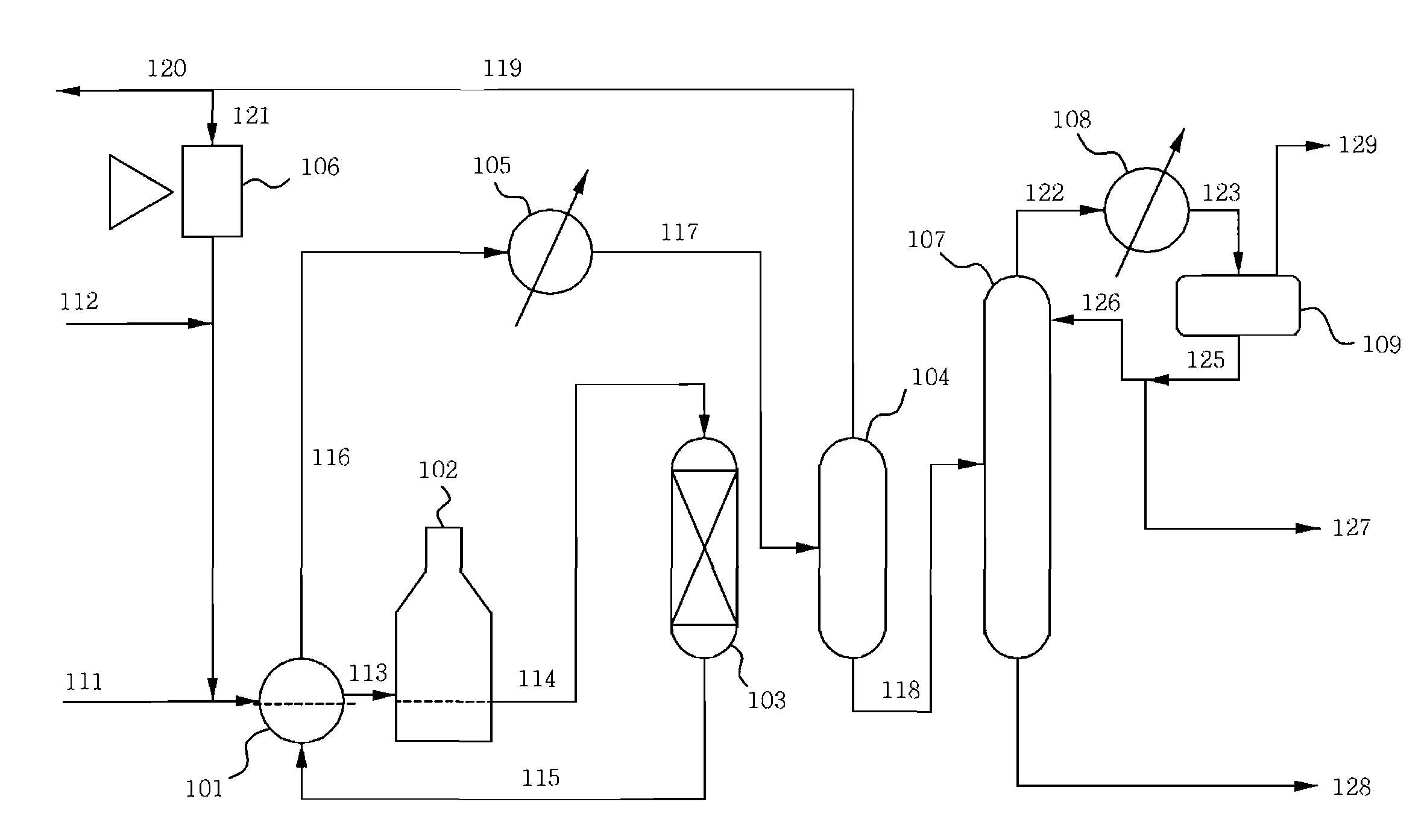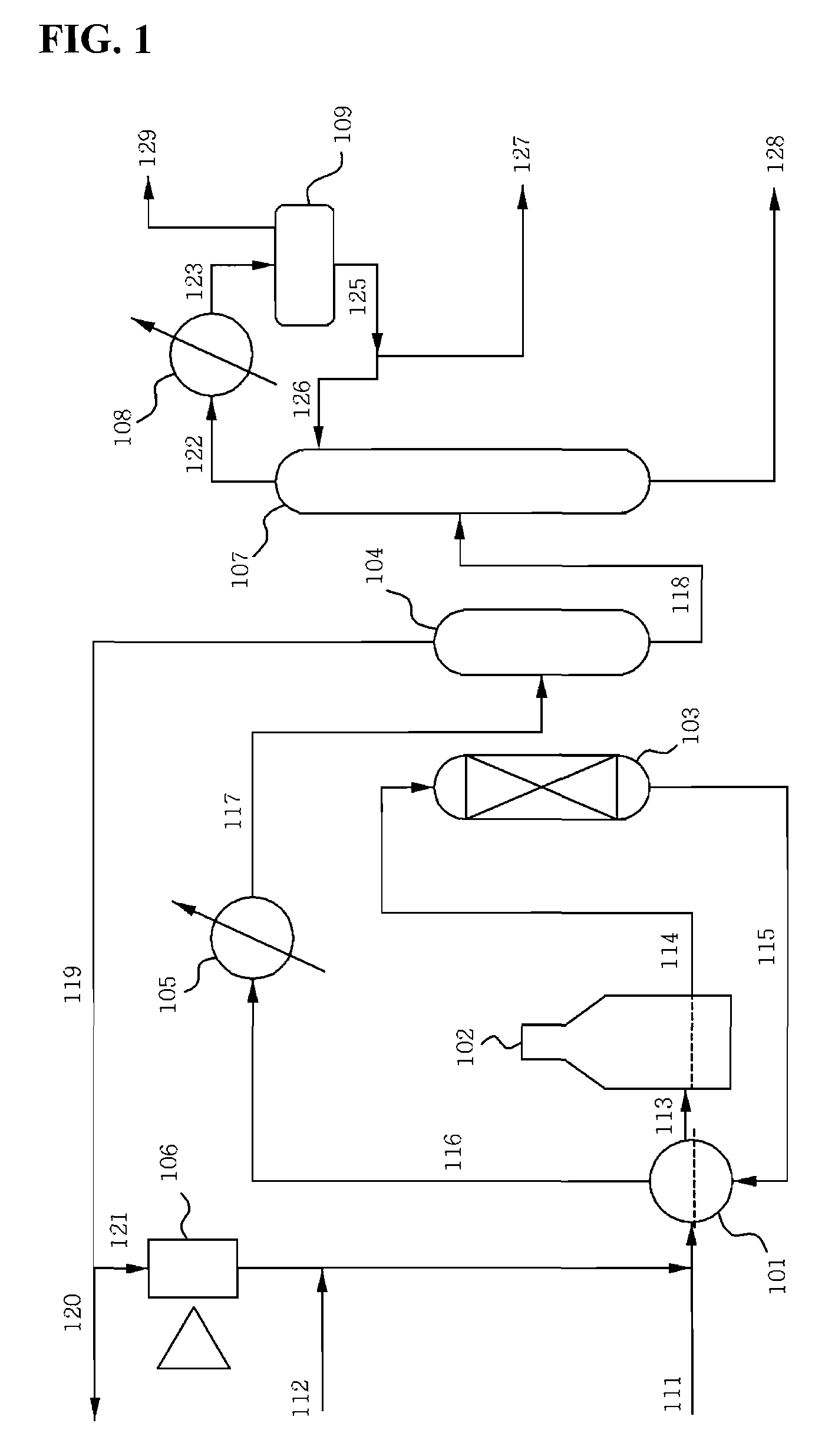Process of preparing aromatic hydrocarbons and liquefied petroleum gas from hydrocarbon mixture
- Summary
- Abstract
- Description
- Claims
- Application Information
AI Technical Summary
Benefits of technology
Problems solved by technology
Method used
Image
Examples
example 1
[0067] A mixture support, comprising ZSM-5 zeolite having a molar ratio of silica / alumina of 30 and γ-alumina as a binder, was mixed with an aqueous solution of H2PtCl6 and an aqueous solution of Bi(NO3)3 such that the amount of ZSM-5 zeolite in the support with the exception of platinum and bismuth was 75 wt %. Platinum and bismuth were supported in amounts of 0.03 parts by weight and 0.5 parts by weight, respectively, relative to 100 parts by weight as the total amounts of ZSM-5 zeolite and the binder. The mixture support thus supported was molded to have a diameter of 2 mm and a length of 10 mm, dried at 120° C. for 3 hours, and then calcined at 500° C. for 3 hours, thus preparing a catalyst. Using the catalyst thus prepared, a hydrocarbon mixture was reacted. The reaction conditions and the reaction results are given in Table 1 below.
example 2
[0068] A mixture support, comprising ZSM-5 zeolite having a molar ratio of silica / alumina of 30 and γ-alumina as a binder, was mixed with an aqueous solution of H2PtCl6 and an aqueous solution of BiCl3 such that the amount of ZSM-5 zeolite in the support with the exception of platinum and bismuth was 75 wt %. Platinum and bismuth were supported in amounts of 0.03 parts by weight and 0.25 parts by weight, respectively, relative to 100 parts by weight as the total amounts of ZSM-5 zeolite and the binder. The mixture support thus supported was molded to have a diameter of 2 mm and a length of 10 mm, dried at 120° C. for 3 hours, and then calcined at 500° C. for 3 hours, thus preparing a catalyst. Using the catalyst thus prepared, a hydrocarbon mixture was reacted. The reaction conditions and the reaction results are given in Table 1 below.
example 3
[0069] A mixture support, comprising ZSM-5 zeolite having a molar ratio of silica / alumina of 30, mordenite having a molar ratio of silca / alumina of 20 and γ-alumina as a binder, was mixed with an aqueous solution of H2PtCl6 and an aqueous solution of BiCl3 such that the amounts of ZSM-5 zeolite and mordenite in the support with the exception of platinum and bismuth were 50 wt % and 25 wt %, respectively. Platinum and bismuth were supported in amounts of 0.03 parts by weight and 0.25 parts by weight, respectively, relative to 100 parts by weight as the total amounts of ZSM-5 zeolite, mordenite and the binder. The mixture support thus supported was molded to have a diameter of 2 mm and a length of 10 mm, dried at 120° C. for 3 hours, and then calcined at 500° C. for 3 hours, thus preparing a catalyst. Using the catalyst thus prepared, a hydrocarbon mixture was reacted. The reaction conditions and the reaction results are given in Table 1 below.
PUM
| Property | Measurement | Unit |
|---|---|---|
| Temperature | aaaaa | aaaaa |
| Percent by mass | aaaaa | aaaaa |
| Percent by mass | aaaaa | aaaaa |
Abstract
Description
Claims
Application Information
 Login to View More
Login to View More - R&D Engineer
- R&D Manager
- IP Professional
- Industry Leading Data Capabilities
- Powerful AI technology
- Patent DNA Extraction
Browse by: Latest US Patents, China's latest patents, Technical Efficacy Thesaurus, Application Domain, Technology Topic, Popular Technical Reports.
© 2024 PatSnap. All rights reserved.Legal|Privacy policy|Modern Slavery Act Transparency Statement|Sitemap|About US| Contact US: help@patsnap.com










